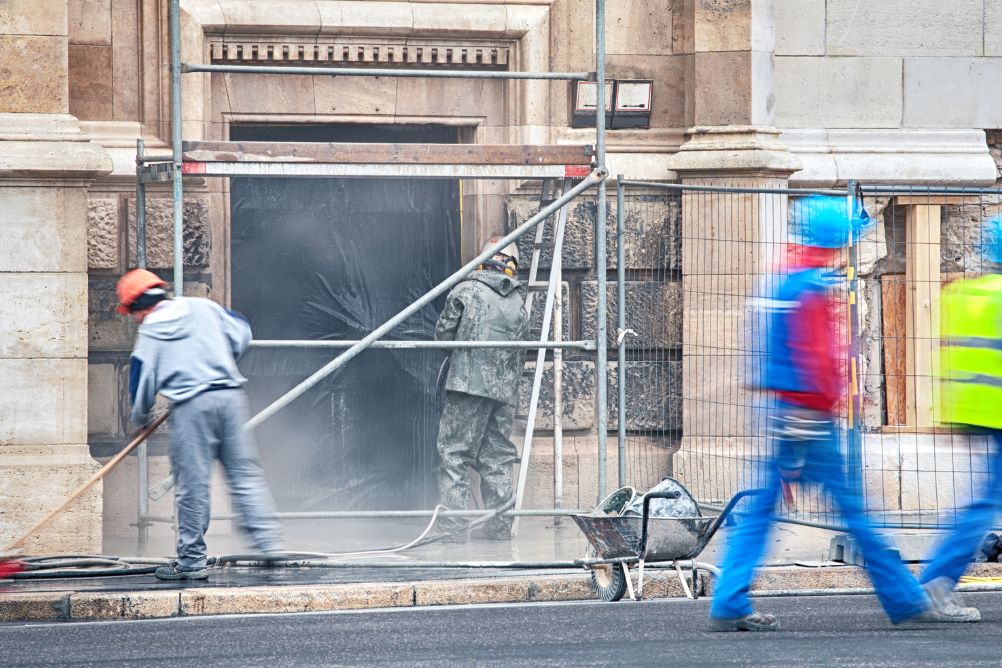Cleanliness and hygiene are crucial factors for any commercial space to create a positive impression on clients, employees, and visitors. While post-construction cleanup plays a significant role in establishing a clean environment, it is equally important to implement ongoing cleaning and maintenance practices to ensure the space remains clean, hygienic, and presentable. This blog post will highlight the essential practices for maintaining cleanliness in commercial spaces beyond post-construction cleanup.
REGULAR COMMERCIAL CLEANING SERVICES: THE FOUNDATION OF CLEANLINESS
One of the fundamental aspects of maintaining cleanliness in commercial spaces is to establish a regular janitorial service routine. This includes:
- Daily Cleaning: Daily cleaning activities such as sweeping, mopping, dusting, and vacuuming should be performed to remove surface-level dirt, dust, and debris. This helps in preventing the buildup of dirt and maintaining a neat and tidy appearance.
- Trash Removal: Regular trash removal is crucial to prevent unpleasant odors and maintain a clean environment. Trash cans should be emptied regularly, and waste should be properly disposed of to promote hygiene and prevent pest infestations.
- Restroom Sanitation: Restrooms are high-traffic areas that require special attention. Regular cleaning and disinfection of toilets, sinks, mirrors, and floors are essential to ensure proper hygiene standards are maintained. Restocking essential supplies such as toilet paper, hand soap, and paper towels should also be included in the janitorial service routine.
DEEP CLEANING SCHEDULES: THOROUGH AND COMPREHENSIVE MAINTENANCE
While daily cleaning takes care of the regular maintenance, deep cleaning is necessary to address hidden dirt, grime, and bacteria that accumulate over time. Implementing a deep cleaning schedule is essential to maintain a healthy and presentable commercial space. Key areas to focus on include:
- Carpets and Upholstery: Regular deep cleaning of carpets and upholstery not only improves their appearance but also eliminates dust mites, allergens, and bacteria. Professional steam cleaning or shampooing should be performed periodically to ensure a fresh and clean environment.
- Hard Floors: High-traffic areas with hard floors require periodic maintenance to remove scuff marks, stains, and embedded dirt. Sweeping, mopping, and polishing should be done as per the manufacturer’s recommendations to extend the lifespan of the flooring and maintain a polished look.
- Windows and Glass Surfaces: Clean and streak-free windows and glass surfaces are essential for a bright and welcoming commercial space. Regular cleaning of windows, glass doors, and partitions using appropriate cleaning agents ensures optimal transparency and enhances the overall aesthetic appeal.
AIR QUALITY MAINTENANCE: FRESH AND HEALTHY INDOOR ENVIRONMENT
Maintaining a clean and hygienic environment goes beyond visible surfaces. The air quality within a commercial space significantly impacts the well-being of occupants. Key practices to ensure fresh and healthy indoor air include:
- Ventilation Systems: Regular inspection and cleaning of ventilation systems, air ducts, and filters are necessary to remove dust, allergens, and contaminants. Proper airflow and ventilation not only improve air quality but also contribute to the overall comfort and productivity of employees.
- Indoor Plants: Indoor plants not only enhance the aesthetic appeal of commercial spaces but also help in purifying the air. Regular dusting of leaves and proper watering should be part of the maintenance routine for indoor plants to thrive and effectively contribute to improved air quality.
SPECIALIZED CLEANING SERVICES: TARGETED SOLUTIONS FOR UNIQUE NEEDS
Certain commercial spaces require specialized cleaning services to address specific cleaning challenges. These services may include:
- Healthcare Facilities: Medical offices, clinics, and hospitals require specialized cleaning to meet stringent hygiene standards. Thorough disinfection of surfaces, proper waste disposal, and adherence to healthcare regulations are essential in these environments.
- Food Service Establishments: Restaurants and food service establishments demand specialized cleaning practices to maintain cleanliness and prevent foodborne illnesses. Regular deep cleaning of kitchen equipment, thorough sanitization of food preparation areas, and proper waste management are critical in these settings.
Maintaining cleanliness in commercial spaces goes beyond post-construction cleanup. Regular janitorial services, deep cleaning schedules, air quality maintenance, and specialized cleaning services are crucial for a clean, hygienic, and presentable environment. By implementing these practices, commercial spaces can create a positive impression, promote employee well-being, and ensure a pleasant experience for all visitors and occupants. Remember, a clean environment reflects a commitment to professionalism and quality in all aspects of business operations.


Recent Comments